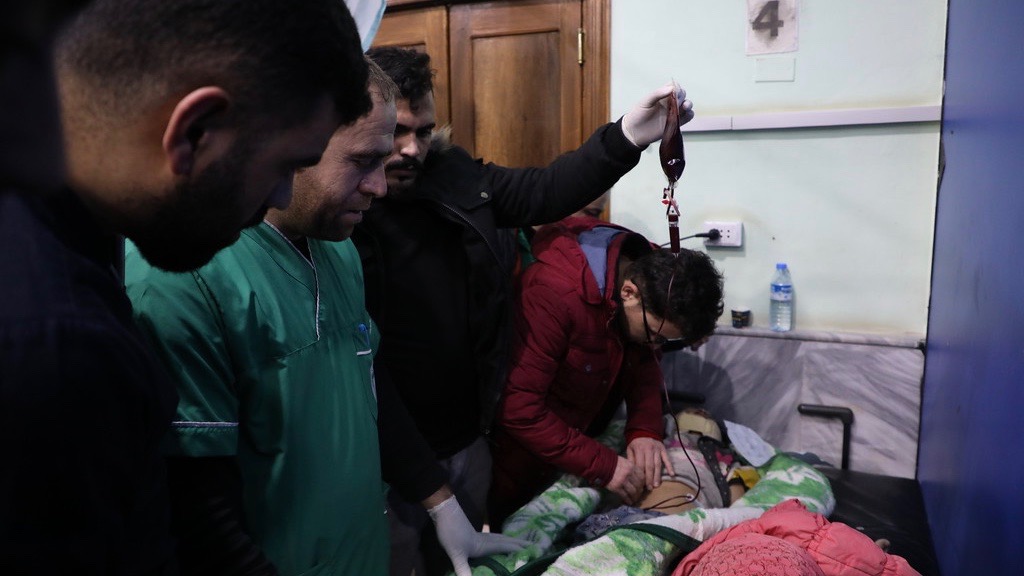Healthcare delivery in Syria remains under threat after two earthquakes hit the northwest of the country and parts of southern Turkey on February 6. The United Nations Office for the Coordination of Humanitarian Affairs (OCHA) reported that over 50 health facilities in Syria have been damaged or completely destroyed in the earthquakes, adding to pre-existing problems caused by sanctions and armed conflict.
In September 2022, the Syrian Ministry of Health reported an outbreak of cholera in the Aleppo region, which was still ongoing at the time the earthquakes hit. Since February 6, access to clean water and sanitation has worsened in comparison to previous months: by February 12, around two-thirds of Aleppo had no access to drinking water due to damage to water infrastructure, warned OCHA. In combination with a lack of food, shelter, and heating materials, this is almost certain to lead to an increase in cholera cases, as well as the spread of other diseases.
According to Fee Baumann, coordinator at the Kurdish Red Crescent (KRC), it is difficult to collect reliable data at this time, since all of northern Syria is struggling with the effects of the earthquake. “The northwest of the country is too damaged, and there are so many different health needs which need to be targeted. In the eastern part, there are generally not enough capacities to confirm the cases. This problem was already there earlier, and now it might get worse,” says Baumann.
Obstacles in the way of delivering humanitarian relief
After the earthquakes a wave of humanitarian relief from around the world was sent to the affected regions, yet—in comparison to Turkey—resources dripped, rather than flowed, into Syria. Sanctions meant that countries from the Global North ignored the needs of the Syrian people and focused on delivering donations to Turkey, whose government apparently holds a better track record in the West despite numerous accounts of attacks on basic rights and freedoms.
Even after the sanctions were temporarily suspended and additional entry points into Syria were approved on February 13, the delivery of humanitarian relief is still slowed down by the presence of numerous checkpoints and discrimination against specific population groups. This has proven particularly true in Kurdish areas, where the delivery of help is being obstructed by both Turkish and Syrian authorities, according to activists. Information collected by the KRC shows that at least 3,000 people left the predominantly Kurdish neighborhood of Sheik Maqsoud in Aleppo in the aftermath of the earthquake. Having just lost their homes or being too scared to live in their houses, the inhabitants of Sheik Maqsoud turned to the camps in Shahba instead of waiting for help that was apparently nowhere on its way. The number of people who choose to do the same will only increase in the coming days in case things do not change, warns Baumann.
Health system starved of resources
Most hospitals in Syria operate on generators and diesel stations because of the limited availability of electricity. As highlighted by the UN Special Rapporteur on unilateral coercive measures and human rights, Alena Douhan, relying on generators means frequent disruptions that impact medical procedures, damage equipment, and patients’ lives. Blocking fuel from reaching the generator-operated hospitals, however, has even more dangerous consequences, leading to people having no access to the most basic care when they need it most.
While the earthquakes definitely dealt additional blows to an already weakened health system, Baumann warns that the situation was so bad to begin with that this is not as visible as one would expect. “There is no significant change in the health system. It is still lacking everything such as medicines and medical supplies, medical equipment and also educated medical staff,” she says.
The general outpouring of solidarity has brought some hope to those hit by the earthquake, but it is essential that this solidarity is translated into concrete action and does not fade away in a matter of weeks. “Even if it is just warm words, it is helping people to resist these inhuman circumstances. We hope that this will continue,” says Baumann.





